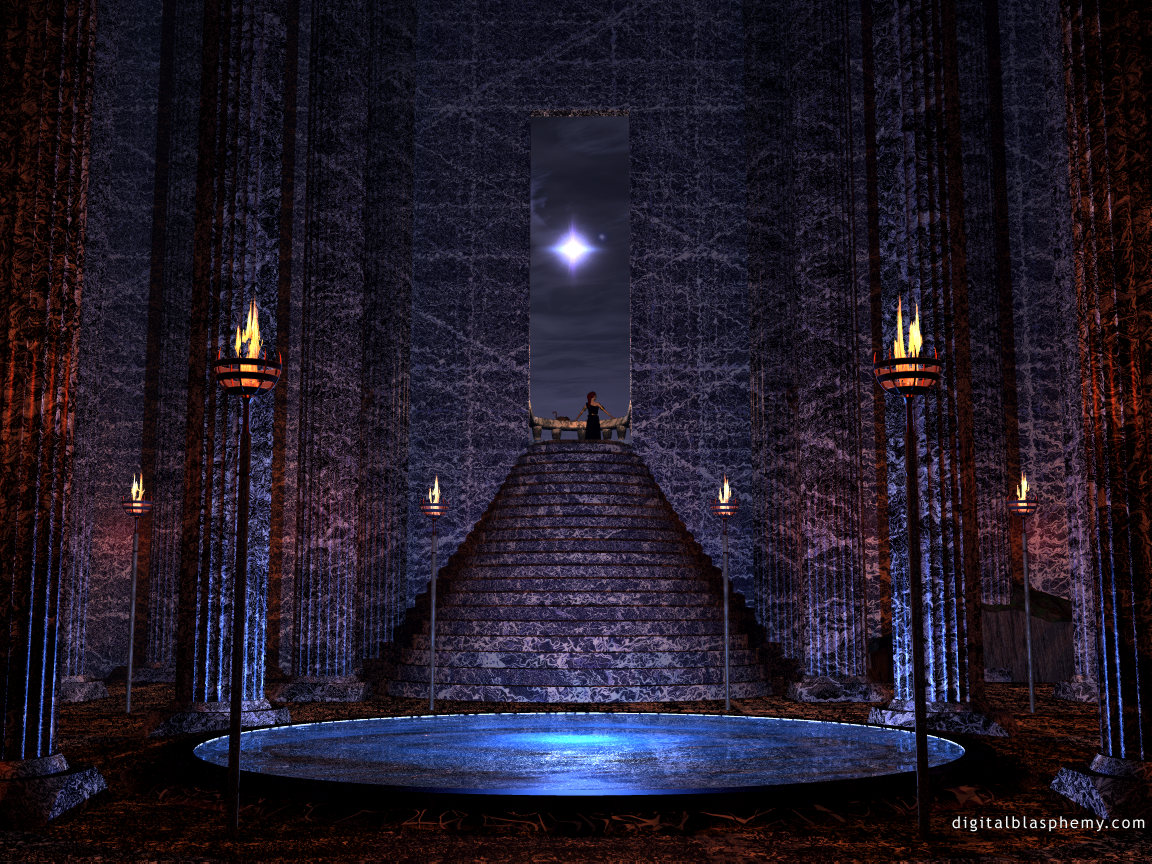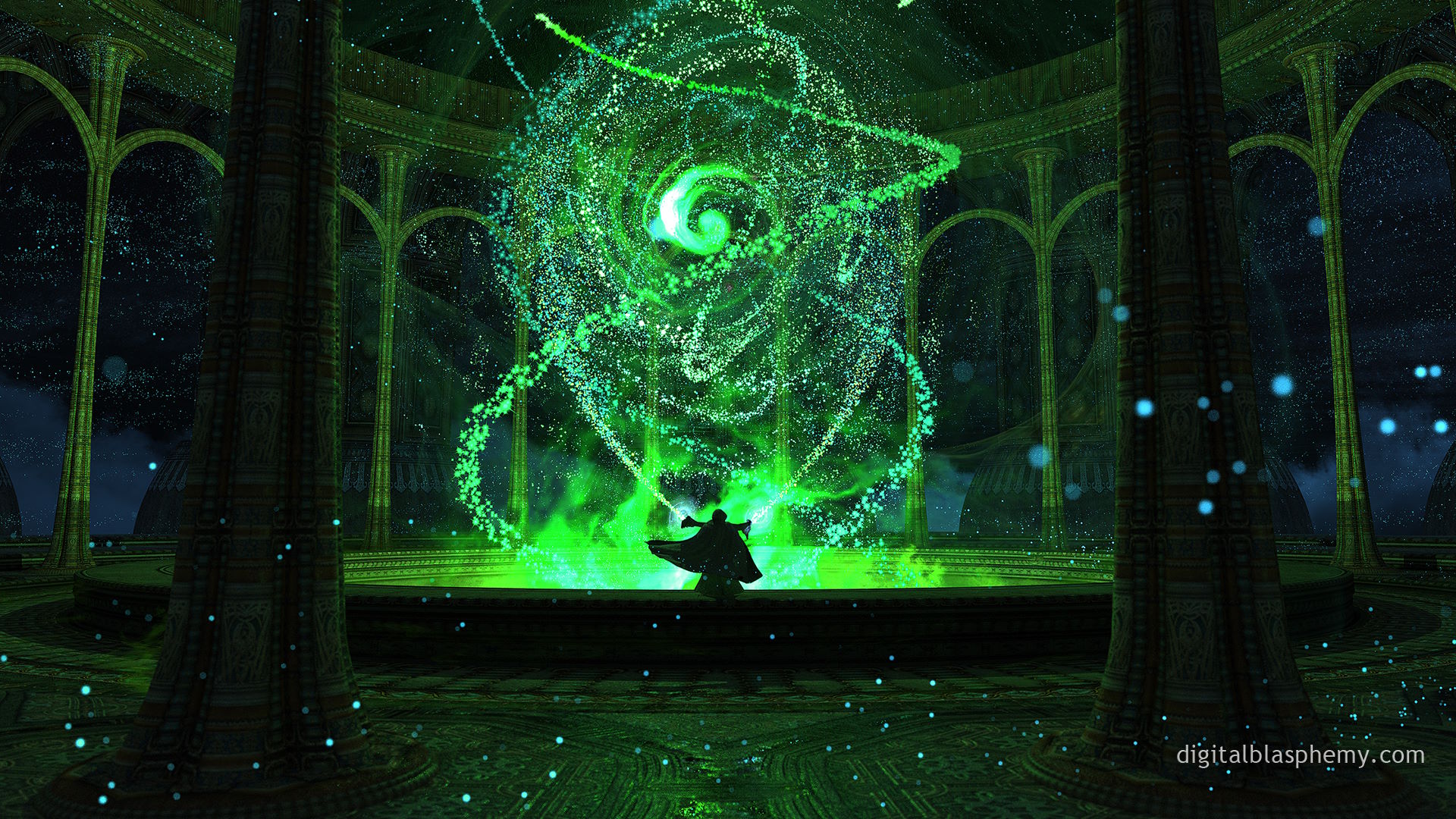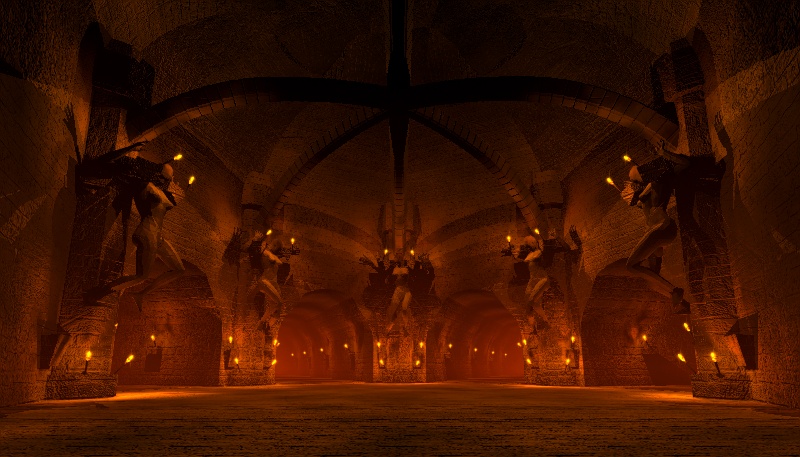The Religions of Tarien
The History of Religion on Tarien
Religious practices have migrated from what we today might call maniacal to a more mundane worship. Modern religion calls for seemingly sporadic visits to shrines and temples. The devout offer prayers and attend ceremonies for important observances. The wealthy maintain a loose tithe to their favored deity while the less fortunate offer what they can when the plate passes through the streets. Such casual worship has not always existed on Tarien. The past holds tales where the faithful served as mere mules for the powers of the church, the gods sacrificed their flock for petty vices, and the cost of religion included privation to the point of sacrificing one’s immortal soul.
Originally, the gods did not exist. Many religious scholars protest this fact, but recent research at the University of Karradone advocates this position. A group of mysterious beings, about which scholars know virtually nothing, known as the Old Ones , created Tarien and then populated the Heaven’s with the gods. Certain gaps in history and events more miraculous than even those of divine origin, lend credence to this belief. Now caretakers of Tarien, the gods, created other residents of Tarien and the Heavens.
Historically, religion has had a large role in the everyday life of Tarien’s residents, from the lowest peasant to the most extravagant Emperor. Religion began with the first races, the Kari-Zaro and the Tzecheni'korak who worshiped the spirits of their ancestors. Organized religion did not begin until the Age of Stars when several gods began to pick their “favored” races. Before the advent of writing, most common folk worshipped an entire pantheon of gods. The past three millennia have seen an increased focus in worship. Some people began to worship certain gods over and even to the exclusion of others. As religious worship focused, individuals also became exceptionally zealous. Devotion became the primary motivation for the lives of the populace. Civilization progressed and became more prevalent. People still worship, but not at the expense of their daily lives. The extremes of secularism and religious totalitarianism still exist today.
Dispersion of Religion
While Anderi dominates the Empire of Eldoria and Arimathica has the King's blessing in Galencia, most of these religions have small priesthoods. Many have little internal structure, and others maintain temples only in the largest cities. The average person prays to the appropriate god when in need of their specific assistance, with the exception of who receive worship Anderi or Arimathica daily in some parts of Tarien.
The racial gods are rarely worshiped outside of their patrons’ homelands, though they have some of the most devout parishioners on Tarien. Wars have broken out over the conflict between some of the racial powers, especially Tyloma and Nosferian.
Religious Forms
Different “focused” religions view other religious beliefs and deities differently. In fact, there are seven distinct religious forms found on Tarien: Atheism, Animism, Monotheism, Pantheism, Patronism, Spiritualism, and Shar’iish’tic worship.
Atheism
Atheists are rare on Tarien. Almost any learned person knows that the gods exist and only a few atheists stand behind their ridiculous theory that the gods are merely fiction. Most self-proclaimed atheists believe that gods have no interest in Tarien. They feel that the gods may watch over the world, but do little to interfere. The routine miracles of the priests are often written off as magic, in a practical, thaumaturgical sense. Most churches discourage atheism and band together to eliminate the corrupting influence an atheist may have on their flock. Jan Crito, Tarien’s most famous atheist, was burned at the stake by Anderi fundamentalists shortly after his landmark book, The Atheist appeared in Galencia .
Animism
Wemic, Kari-zaro, Tzecheni’korak and Kyushu do not worship gods in the sophisticated manner of other religions. Instead, they believe that the spirits of their ancestors hold knowledge and power. In dreams or in crude ceremonies, that often include induced hypnotism or hallucination, they speak with these spirits. The spirits teach them wisdom and often foretell the future. Those who speak with these spirits are called Shaman, and often have great political influence within the culture. They also have the capacity to harness the spirit’s powers and perform miracles, similar to a priest of a more cultured civilization.
While the nature of these spirits remains a mystery, some scholars speculate that they are the souls of powerful mortals, bound for some reason to Tarien. Others believe that the powers of the Shaman come from a deity, just like that of a priest, although the Shaman and their tribes perceive their form through uncultured eyes. In any case, Shamans do have power, and the theory proposed by early Eldorian missionaries to the Jungles of Thallox that the Shaman are charlatans, has been fully debunked.
Monotheism
In the forests of Soulmeliti and Merdenkal , monotheism, a sophisticated, albeit convoluted, form of religion, has developed. Both religions have evolved past the point where they believe that believe that their deity hold supreme importance. The Soulmeliti and Elynthi deny the existence of other gods altogether. Both cultures view their opposite’s god as a powerful anti-being. They claim their opposites worship black powers and preach ungodly evils. Each culture views its own as the own true civilization on Tarien. They view other cultures with suspicion or arrogant disregard.
The primary problem that arises with a monotheistic religion on Tarien lies in the obvious presence of other, miracle-working religions. The religions of Tyloma and Nosferian resolve this issue by declaring that other miracles are merely a function of their respective god’s grace to a less divine culture. The exception to this situation, of course, lies in respect to each other. As a rule, monotheistic theologians declare miracles from the opposing religion come from dark pacts, or the manipulations mortal magic.
Pantheism
Most humans in Tarien follow this practice. They worship multiple deities, prayer to the most appropriate god of the moment. An Eldorian man or woman, for example, might celebrate their wealth under the guidance of Landric, pray for their crops from Chetria, and thank Arimathica for their health. These people are often simple, although even the aristocracy follows this pattern of belief. Some cultures do worship one god or goddess more than another, such as Galencian worship of Arimathica or Eldorian worship of Anderi, but they respect the other deities and have no qualms about offering them their prayers.
Patronism
Beyond the Soulmeliti and Elynthi, many non-human, and even one human culture believe that their favored god has chosen their particular group. The Khadra, Orks , Dharja, Nerrid, and Mennithites all believe that their god pays special attention to their needs and prayers. They do not exclude other gods from respect, but rarely worship them. Their temples tend to be extreme, either in their baroque glory or in pure simplicity. With the exception of the Mennithites, these religions do not force their worship on others. The non-devout are either unworthy of such evangelism or time has taught their priests to save words from deaf ears.
Spiritualism
This form of religions varies from atheism in a single, crucial respect. Those who practice it, such as the Drakshal monks and the Flind or the flocks of the Kenku, do not disavow any belief in the gods. Instead, they believe that the way to spiritual enlightenment is self-purity. By understanding one’s nature, practitioners of this faith believe that they will reach self-enlightenment. Gods have little to do with their everyday lives. While some may rely on the heavens for assistance, those of spiritualism refute such help. Conversely, many religions denounce the body. Spiritualists, however, believe that harmony between soul and body is essential to understanding their spiritual well being. Many spiritualists practice martial arts, where lightning movements blend with long periods of absolute stillness.
Shar’iishtisism
The Order of Shar'iish'ta worships the Great Mother who maintains balance on Tarien. They understand the order of nature. The strong prey on the weak, but when they prey too much, they deplete their supply, and starve. The Order dislikes off-world influences on the plane. Although this group seeks harmony, opinions within the Order may border upon the extreme. Some Shar’iishtic priests firmly believe in the theory of survival of the fittest. Others believe in pure harmony, where some need the assistance of others to survive. Together, they are a secretive group whose international activities are often felt, but rarely seen.
He provides us with the light by which we farm, by which our crops thrive, by which we exist, and all that he asks is that we maintain our faith.
Miracles of Faith
Much is made of the magi on Tarien and the horrors it has caused. The faithful, however, do not rely on such mortal parlor tricks for help. Instead, their gods grant them power directly. These events, common in a world bent to the whim of its deities, are called miracles. And these acts, while seemingly magical in nature, do not draw the ire of the populous or run afoul of anti-mage laws. Priests of all faiths and persuasions perform miracles. They heal the sick and inflict plagues on evil. They light the darkness and blind the unrighteous. They bring the rains and move the sun.
There are a few rules that govern the miracles of faith. First, only the most devout receive blessings directly from their gods. While most people pray to the gods, few have that deep seeded belief that leads to a miracle. Normally, only sanctified priests of a god will have the necessary faith to request a miracle. Scholars have argued the rationale behind this fact for over a millennia. Some claim that the gods only listen to those who shut other deities from their hearts, while others claim the faith of the masses is not pure, but transient. Regardless of the reason, gods almost never grant miracles to the non-ordained.
A second rule is that while the gods may grant miracles, they remain fickle in the distribution of their powers. Normally, gods reward their chosen with miracles with what seems to be disregard. An Arimathican priestess will heal even the evilest murderer without a thought. These are the beliefs of her goddess. They do not however, grant actions that do not reflect these beliefs. Requests for them may even bring a baneful existence to the priest who requests them.
Often these miracles are not free. Priests suffer fatigue after the power of their deity flows through them. Minutes may stretch into weeks of recovery for miracles that defy nature. Occasionally, if the miracle passes far enough out of the bounds of day to day existence, or if the priest’s faith is not strong, a token, or sacrifice must be made. While religion on Tarien has passed beyond human sacrifice, the destruction of animals or valuables is common.
The Forgotten God
With the banning of magic in most human lands, worship of Legerdemain , the human who discovered magic in the Arm of the Gods, brought it to Tarien, and ascended to godhood has waned. Scholars postulate that with the lack of followers, he may have become dormant or even died.
The Shar'rah wisdom comes not from words, but from images and the possibilities they represent.




